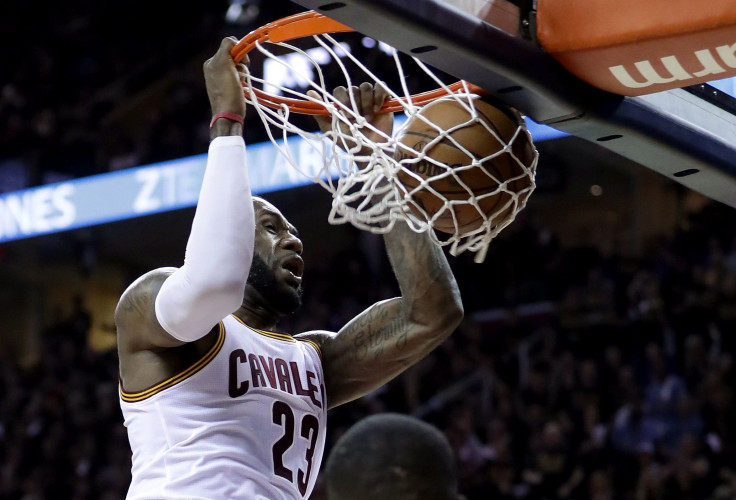Cavs vs. Warriors: 3 Reasons Why The Cavaliers Will Win Game 7 Of The 2016 NBA Finals

Defying history, odds, and to some extent reason after falling behind 3-1 to a team many believe to be the greatest in NBA history, the Cleveland Cavaliers and superstar LeBron James managed to force a decisive Game 7 against the Golden State Warriors for the right to be called 2016’s undisputed champion.
Considering how poorly the Cavs played in the first two games of the finals, it’s almost unthinkable they are on the verge of securing the first title in the franchise’s history. Cleveland endured harrowing 15 and 33 points losses at Oracle Arena, as James put up his usual top notch numbers but the rest of the Cavs looked downright lost. Some hope was injected into the series after 120-90 blowout victory in Game 3 at home, but it was quickly dashed when Golden State responded with a stellar 108-97 win to build a 3-1 series lead.
But James, point guard Kyrie Irving, and the Cavs defense answered the bell with two monster wins to put the Warriors' claim to a second consecutive title on hold. Cleveland is now the third team in league history to erase a 3-1 deficit and force a Game 7, joining the 1965-66 Los Angeles Lakers and the 1950-51 New York Knicks.
Neither of those teams prevailed in the final stanza of their series, but there’s evidence to support the notion that Cleveland could be the first to complete the previously unthinkable.
Here’s three reasons why the Cavaliers will march to a third straight victory and complete arguably the greatest comeback in NBA history.
King-Making
Appearing in the seventh finals, and sixth straight, of his career, James commanding the crown as the NBA’s best all-around player isn’t new. But it’s quite possible the four-time MVP has reached another stratosphere of play.
James put up 41 points apiece in Games 5 and 6, becoming the first player since Shaquille O’Neal to do so in the finals, while going 32-for-57 (56 percent) from the floor. He’s also knocked down seven of his 14 three-point attempts, assisted 18 other baskets, and corralled 24 rebounds.
His defense has also been spectacular, evidence by six blocks and seven steals over 86 minutes, but James has shown hustle and determination that doesn’t show up on the stat sheet.
If James continues this level of play, he’ll not only give the City of Cleveland its first title in 52 years, his already Hall-of-Fame-worthy legacy might finally be comparable to that of Michael Jordan.
Tristan, Tristan, And More Tristan
When Warriors center Andrew Bogut with a knee injury eight minutes into Game 5, the Cavs unleashed big man Tristan Thompson and his contributions have been just as important as Irving’s consistent scoring. And there’s little doubt Cavs head coach Tyronn Lue immediately took advantage of Bogut’s absence. Thompson’s minutes have increased by a third since Bogut’s injury, logging 42 and 43 minutes the last two games compared to a previous series high of 31 minutes in Games 1 and 3. Before the finals, Thompson didn’t average more than 29 minutes in any of the three previous series.
Thanks to the increase in court time, Thompson pulled down 15 boards in Game 5 and another 16 in Game 6, while adding 15 points in the latter game simply hanging around the paint and punishing Golden State head coach Steve Kerr for rolling out his small-ball “Death Lineup.”
Thompson's free-throw shooting may play a crucial role.
Make Warriors Pay For TOs
Cleveland is on a roll because of James and Thompson, but also because they are actually making Golden State pay for its high turnover rate on the fast break. A mere 9.7 percent of the Warriors points have come on the break. Meanwhile, Cleveland’s way up in the finals to 15.9 percent from 11.4.
Through six games each side has committed 88 turnovers, and Golden State has a slight edge in points off turnovers, scoring 108 to Cleveland’s 104. However, the Cavs are actually ahead on fast-break points 97-59, a somewhat surprising fact given 13.8 percent of Golden State’s offense has come on the break during these playoffs, but that’s also down from 18.2 percent in the regular season.
Overall throughout the postseason Golden State’s actually taken slightly better care of the ball, allowing 14.2 giveaways compared to 14.9 during their 73-win regular season, which ranked them No. 25 in the league.
But the Warriors could afford to take such poor care of the ball because their offense was so potent and because they were second in pace at 99.3 possessions per 48 minutes, which also serves as the main reason for the high giveaway rate. When in tandem, Golden State’s three-point shooting and its defense would bail it out time and again even if turnovers were high. The Warriors allowed opponents to shoot just 43.5 percent from the field during the season, the third-best mark in the league. Consequently, opponents were often so far back of the Warriors that turnovers made little difference.
Except, when the Cavs are hot from the field and forcing turnovers the Warriors simply can’t stop them. In each of their wins, the Cavs have shot at least 51 percent overall and 37 percent from three. In Game 3, they shot 52.7 overall and 48 percent from long range, Game 5 was 53 and 41.7 percent, and Game 6 was 51.9 and 37 percent. And in each game Cleveland forced 18, 17, and 14 turnovers, respectively.
The Cavs are clearly rolling and if their shots keep falling, the title is theirs.
© Copyright IBTimes 2024. All rights reserved.











